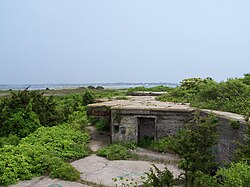Fort Mansfield
| Fort Mansfield | |
|---|---|
| Part of Harbor Defenses of Long Island Sound | |
| Napatree Point, Westerly, Rhode Island | |

The remains of Fort Mansfield on Napatree Point.
|
|
|
Location in Rhode Island
|
|
| Coordinates | 41°18′23″N 71°53′05″W / 41.30639°N 71.88472°WCoordinates: 41°18′23″N 71°53′05″W / 41.30639°N 71.88472°W |
| Type | Coastal Defense |
| Site information | |
| Owner | State of Rhode Island, public beach |
| Controlled by | Town of Westerly |
| Open to the public |
yes |
| Site history | |
| Built | 1901 |
| Built by | United States Army |
| In use | 1901-1917 |
| Battles/wars | none |
Fort Mansfield was a coastal artillery installation located on Napatree Point, a long barrier beach in the village of Watch Hill in Westerly, Rhode Island.
Fort Mansfield and similar forts stretching from Galveston to Maine can be traced back to a joint Army-Navy Board created in 1883 known as the Gun Foundry Board. Its 1884 report warned of the defenseless condition of the USA's coasts and recommended a system of fortifications to protect harbors and coastal cities from invasion. In 1885, this Board was replaced by what has become known as the Endicott Board which issued formal recommendations for a major coastal defense network in 1886. Fort Mansfield was one of numerous coastal artillery installations constructed in the Harbor Defenses of Long Island Sound as part of the coastal defense network for New York City. It was named in honor of Joseph K. Mansfield (1803–1862), who served as an engineer officer during the Mexican War and was eventually promoted to Inspector General of the Army; as a general, he was killed at the Battle of Antietam in the Civil War.
In 1898, the United States government purchased 60 acres (240,000 m2) on Napatree Point, a long, narrow spit of land jutting out from Watch Hill. The fort was located on a bend in the spit beyond which was called Sandy Point. Construction of the fort began the following year. When the fort was first manned in 1901, it was considered a sub-post of Fort Trumbull in New London, Connecticut. But when the fort was fully manned in 1902, its status changed to an independent battery. The fort’s main armament consisted of Battery Wooster, two 8-inch M1888 (203 mm) disappearing guns; Battery Crawford, two 5-inch M1897 guns (127 mm) on balanced pillar carriages; and Battery Connell, two 5-inch M1900 guns on pedestal mounts. The balanced pillar was a type of retractable carriage that soon proved impractical and was disabled in the up position. Battery Wooster was named for David Wooster, a Revolutionary War general who died in the Battle of Ridgefield, Connecticut. Battery Crawford was named for Emmet Crawford, an Army officer killed pursuing Geronimo in 1886. Battery Connell was named for James W. Connell, an Army officer killed in the Philippine-American War.
...
Wikipedia

